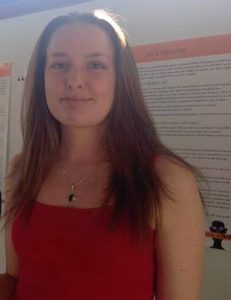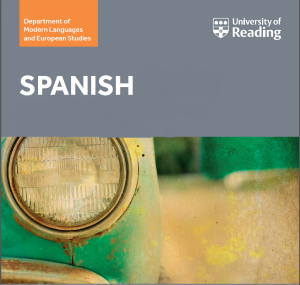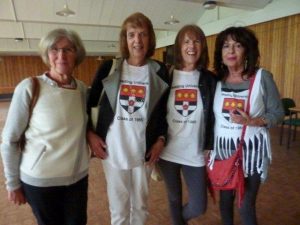 Lucia Crowther graduated in 2015 with a degree in Italian and History of Art. An excellent and committed student throughout her degree, Lucia was the recipient of the Meneghello-Italianist UG Prize for outstanding academic achievements in Italian Studies. Her dissertation entitled ‘The architectural formalisation of pilgrimage in the portico of the Madonna di San Luca’ was awarded the prestigious British-Italian Society Memorial Rooke Prize for the best UG dissertation in Italian Studies in 2016.
Lucia Crowther graduated in 2015 with a degree in Italian and History of Art. An excellent and committed student throughout her degree, Lucia was the recipient of the Meneghello-Italianist UG Prize for outstanding academic achievements in Italian Studies. Her dissertation entitled ‘The architectural formalisation of pilgrimage in the portico of the Madonna di San Luca’ was awarded the prestigious British-Italian Society Memorial Rooke Prize for the best UG dissertation in Italian Studies in 2016.
In 2016, Lucia won a full EU-funded Unibo Azione 2 scholarship from the University of Bologna to attend an extremely selective two-year Master’s programme in Visual Arts.
Let’s hear how she is settling in the world’s oldest university.
One year on
I’d never formally studied Italian before I began my bachelor’s degree, so in some ways it feels quite surreal to find myself where I am now. One year after graduating from Reading I’m living in Italy and doing my Master’s degree at the University of Bologna. This is the city I came to for my Erasmus year, and I think I’m only just now appreciating how much that year abroad and my whole degree experience at Reading changed my life.
I still remember the first evening I ever spent in Bologna. Late in the day, standing in a bar in the centre of town surrounded by a crowd of new local friends, someone asked me if I was happy to have chosen the city for my Erasmus placement. I shouted back over the music that I was delighted, and couldn’t wait to try my first spaghetti bolognese. Well, the whole place went silent. I now know, as I’m sure almost everyone reading already does too, that ‘spag-bol’ does not exist in Bologna, and that the locals can spot a tourist a mile away as anyone who doesn’t know that tagliatelle al ragù is the dish to ask for in the Italian capital of food.
That evening taught me a few lessons: firstly, the people of Bologna are among the friendliest, kindest and most forgiving on Earth. The impromptu night-time tour of the city I was given a few hours later was testament enough to that. But secondly, if you move to a new country you will never stop learning new things, and your life will never be dull (whether you want it to be or not!). That’s why I knew I had to come back, one way or another, and at the beginning of September I unpacked my suitcase here for the second time.
After the brilliant Italian language and culture teaching I had at Reading, I felt confident enough to apply directly to Bologna earlier this year. I was lucky enough to be awarded one of the scholarships reserved for international students, and I realised that Italian universities are really welcoming to foreign students. My MA is in the Visual Arts, which is the perfect subject to study in a country so full of beautiful art and architecture, and it’s also really interesting to see how different the postgraduate degrees are over here. I’m able to study a really broad range of topics, so my courses this year range from art restoration, to iconography, to Museum studies. I’ve also made so many new Italian friends in Bologna, and every time I manage to get though a whole day without saying anything inappropriate about their pasta I feel like an honorary Italian all over again.
It’s not for the faint hearted, however. Italian students usually write 30 – 50,000 word dissertations to graduate from their MA courses, so I’ve got all that to looks forward to next year! But while I was at Reading I already managed to do so many things I never thought I’d be able to. I never expected to go from zero Italian to let’s-move-to-Italy-and-start-a-new-life standards, but my degree got me there. And that’s not all: during my second year my tutor Dr La Penna helped me to get a placement as a research assistant with the Undergraduate Research Opportunities Programme (UROP), so I contributed to the databases of the Diasporic Literary Archives project and learned so much from working with researchers from across the University. Then in my final year a module with Dr Faloppa gave us the chance to replace an essay with a personalised project, so I was able to curate an exhibition based on my favourite charity, Amnesty International. After all those different experiences, to mention just a few, I don’t feel worried about taking on a new challenge, and being in this stunning city is all the inspiration I need.
So if you want to see what is, in my opinion, one of the most under-appreciated, lively and cultured cites in Europe, then come and visit any time! You’ll have a lot of new friends before the first night is even over, and if you can get through a whole evening without mentioning spaghetti then it might just be safe to show you where they do the best tagliatelle al ragù in town…


 Class of 2015 graduates from those disciplines are employed at higher rates than their cohorts in the class of 2014, and starting salaries rose significantly, according to the National Association of Colleges and Employers’ annual first-destination survey of recent graduates in the workforce.
Class of 2015 graduates from those disciplines are employed at higher rates than their cohorts in the class of 2014, and starting salaries rose significantly, according to the National Association of Colleges and Employers’ annual first-destination survey of recent graduates in the workforce.

 In Mexico, both 31st October and 1st November are big celebrations. Dr Catriona McAllister, who teaches Latin American history and culture, describes Día de muertos traditions for us: ‘On 2nd November (coinciding with the Catholic festival of All Souls Day), Mexico celebrates the Day of the Dead. The festival offers the opportunity to remember and honour departed loved ones and has its origins in pre-Hispanic traditions that were later combined with Catholic practices. Celebrations can take place over several days, and it is traditional to visit cemeteries where loved ones are buried and to prepare an altar at home. Altars usually contain a range of objects including flowers (particularly cempasúchiles, or marigolds), the favourite food of the departed loved one, candles, objects belonging to the departed, photos and decorated sugar skulls’.
In Mexico, both 31st October and 1st November are big celebrations. Dr Catriona McAllister, who teaches Latin American history and culture, describes Día de muertos traditions for us: ‘On 2nd November (coinciding with the Catholic festival of All Souls Day), Mexico celebrates the Day of the Dead. The festival offers the opportunity to remember and honour departed loved ones and has its origins in pre-Hispanic traditions that were later combined with Catholic practices. Celebrations can take place over several days, and it is traditional to visit cemeteries where loved ones are buried and to prepare an altar at home. Altars usually contain a range of objects including flowers (particularly cempasúchiles, or marigolds), the favourite food of the departed loved one, candles, objects belonging to the departed, photos and decorated sugar skulls’. We are very pleased to announce that we have launched a Single Honours degree in Spanish and Latin American Studies, starting from September 2017!
We are very pleased to announce that we have launched a Single Honours degree in Spanish and Latin American Studies, starting from September 2017! In a globalised world we are confronted with an increasingly diverse mix of languages and cultures, bringing new challenges to language professions. This series explores the role of language and translation in danger situations, and considers what it takes to work as a translator or interpreter in these contexts. Presented by a mix of practitioners and academics, it will demonstrate how language professions have changed because of these situations, and how translating/interpreting involves more than linguistic knowledge.
In a globalised world we are confronted with an increasingly diverse mix of languages and cultures, bringing new challenges to language professions. This series explores the role of language and translation in danger situations, and considers what it takes to work as a translator or interpreter in these contexts. Presented by a mix of practitioners and academics, it will demonstrate how language professions have changed because of these situations, and how translating/interpreting involves more than linguistic knowledge. To all students of Modern Languages and European Studies!
To all students of Modern Languages and European Studies! On 4th September 2015 Reading University’s Alumni Office was kind enough to organise a guided tour for the 6 of us celebrating, with our partners, the 50th anniversary of our freshman year.
On 4th September 2015 Reading University’s Alumni Office was kind enough to organise a guided tour for the 6 of us celebrating, with our partners, the 50th anniversary of our freshman year. We then moved on to the Language Department of HUMSS where five of us had enrolled for French or French combined with Italian and one for Classics. The foyer of the building seemed little changed and served to jog a memory of being press-ganged into doing Linguistics as our third subject, totally unappreciative of how privileged we were to be some of the first of David Crystal’s students! Here we met up with Dr Veronica heath who had herself been a student in the 80s, taught by many of the profs and lectures who variously inspired, amused and scared us witless. Much nostalgia was evoked by names from the past, including Prof Lehmann, Michael Holland, Dr Dale, Dr Redfem, Geoffrey Strickland, Prof Meneghello, Dr Lepsky and John Scott to name but a few. All of us spent out third year in
We then moved on to the Language Department of HUMSS where five of us had enrolled for French or French combined with Italian and one for Classics. The foyer of the building seemed little changed and served to jog a memory of being press-ganged into doing Linguistics as our third subject, totally unappreciative of how privileged we were to be some of the first of David Crystal’s students! Here we met up with Dr Veronica heath who had herself been a student in the 80s, taught by many of the profs and lectures who variously inspired, amused and scared us witless. Much nostalgia was evoked by names from the past, including Prof Lehmann, Michael Holland, Dr Dale, Dr Redfem, Geoffrey Strickland, Prof Meneghello, Dr Lepsky and John Scott to name but a few. All of us spent out third year in  Lyon, those there for the whole year witnessing Les Événements of May 1968 at the first hand. It was here that our long-lasting friendship was cemented.
Lyon, those there for the whole year witnessing Les Événements of May 1968 at the first hand. It was here that our long-lasting friendship was cemented.
 We are delighted to welcome our new Teaching Fellow in French Language, Miss Marine Orain, in September 2016. Marine joins us from Birkbeck College and she will be teaching Language modules. Marine holds an MA in Teaching French as a Foreign Language from the University of Cumbria and she is completing her PhD thesis on French intellectuals.
We are delighted to welcome our new Teaching Fellow in French Language, Miss Marine Orain, in September 2016. Marine joins us from Birkbeck College and she will be teaching Language modules. Marine holds an MA in Teaching French as a Foreign Language from the University of Cumbria and she is completing her PhD thesis on French intellectuals.